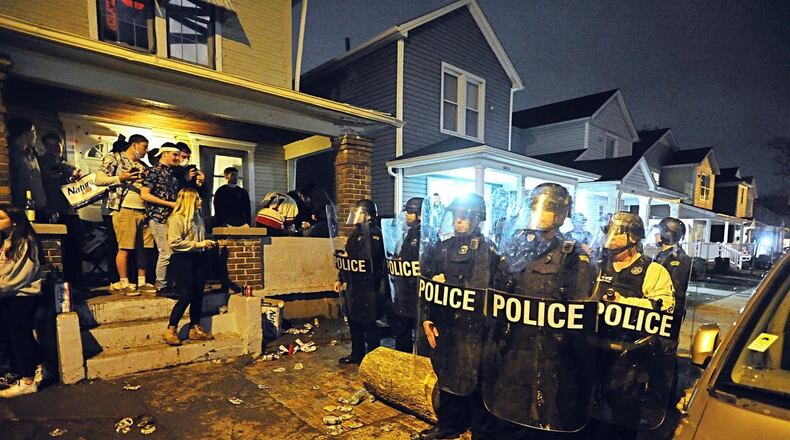The law also would hold property owners, residents and other individuals accountable when they permit, host, sponsor or support “nuisance parties” at their properties, according to the legislation and the police chief.
The police department is asking the City Commission to approve the proposed legislation as an emergency so it would take effect immediately.
In a memo, Chief Kamran Afzal said police want the law to be in effect for upcoming events that have a “history of riotous and disorderly behavior.”
Credit: KEEGAN GUPTA
Credit: KEEGAN GUPTA
Last March, large crowds gathered on the University of Dayton campus area for a weekend party that led to clashes with police and about nine related arrests.
The partying took place during belated St. Patrick’s Day celebrations.
Police and students and other partiers have clashed at least half a dozen times in the last decade during large parties, mainly in March, that were held in the residential areas around UD’s campus. The history of large March parties in the streets on the UD campus stretches back for decades.
Last year, revelers flipped a car and threw bottles, cans and other objects at police, who were in riot gear.
Of the nine people arrested, eight were not students, officials said.
After last year’s events, UD officials said they would work with Dayton law enforcement about how to better respond to large gatherings in student areas.
Some of the people arrested last year were charged with misdemeanor crimes like riot, disorderly conduct, obstructing official business, resisting arrest and misconduct at an emergency, according to Dayton Municipal Court records.
Some charges resulted in criminal convictions, though others were withdrawn, many at the request of the prosecutor.
In September, police made two arrests after receiving reports of a large gathering, fights and possible weapons violations in a student neighborhood. Police helped disperse the crowds.
Under the proposed legislation, people who allow or endorse nuisance parties on their properties can face penalties that start as minor misdemeanor offenses but escalate to third- or fourth-degree misdemeanors for subsequent violations.
The proposed legislation says that nuisance parties must cease at the order of the police chief or the chief’s designee, and everyone who does not live at the party site must leave.
Failing to obey this order could lead to fourth-degree misdemeanor criminal charges.
Police also have responded to large, unruly parties elsewhere in the city after receiving reports of fights, gunshots, shootings and other unlawful activities.
Last summer, a large police presence descended on a home in the South Park neighborhood.
The owners of an Airbnb short-term rental said in an online post that a guest who was staying at the home held a party even though that was not permitted and they tried to cancel the booking.
911 callers told police there was a party at the house, and someone who drove by fired about half a dozen shots, hitting the home and vehicle a parked out front.
Some local house parties have ended in violence and tragedy following arguments and conflict and drunken encounters. A 2022 example in East Dayton resulted in a man being shot five times.
About the Author

